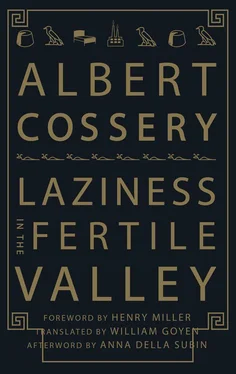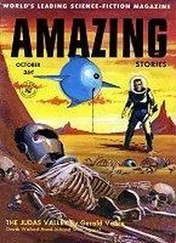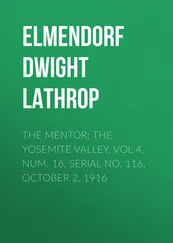Albert Cossery - Laziness in the Fertile Valley
Здесь есть возможность читать онлайн «Albert Cossery - Laziness in the Fertile Valley» весь текст электронной книги совершенно бесплатно (целиком полную версию без сокращений). В некоторых случаях можно слушать аудио, скачать через торрент в формате fb2 и присутствует краткое содержание. Год выпуска: 2013, Издательство: New Directions Publishing Corporation, Жанр: Современная проза, на английском языке. Описание произведения, (предисловие) а так же отзывы посетителей доступны на портале библиотеки ЛибКат.
- Название:Laziness in the Fertile Valley
- Автор:
- Издательство:New Directions Publishing Corporation
- Жанр:
- Год:2013
- ISBN:нет данных
- Рейтинг книги:3 / 5. Голосов: 1
-
Избранное:Добавить в избранное
- Отзывы:
-
Ваша оценка:
- 60
- 1
- 2
- 3
- 4
- 5
Laziness in the Fertile Valley: краткое содержание, описание и аннотация
Предлагаем к чтению аннотацию, описание, краткое содержание или предисловие (зависит от того, что написал сам автор книги «Laziness in the Fertile Valley»). Если вы не нашли необходимую информацию о книге — напишите в комментариях, мы постараемся отыскать её.
Laziness in the Fertile Valley — читать онлайн бесплатно полную книгу (весь текст) целиком
Ниже представлен текст книги, разбитый по страницам. Система сохранения места последней прочитанной страницы, позволяет с удобством читать онлайн бесплатно книгу «Laziness in the Fertile Valley», без необходимости каждый раз заново искать на чём Вы остановились. Поставьте закладку, и сможете в любой момент перейти на страницу, на которой закончили чтение.
Интервал:
Закладка:
“Oh, I love you,” said Hoda. “Kiss me quickly! My master is waiting for his lunch.”
In the afternoon, Serag took the books to Abou Zeid. The peanut vendor was squatting outside his shop in his usual position, warming himself in the sun; he was apparently applying himself to certain putrefaction. His gaunt and hairy face was stamped with an ageless torpor. The baskets standing near him were almost empty.
“Good day, Abou Zeid!”
“Good day, my young gentleman!” replied Abou Zeid. “What have you there?”
“Books,” said Serag. “I’ve come with a wonderful idea for your business.”
Abou Zeid looked benevolently at the young man, and at the same time, with real apprehension. Above all, he feared being upset, and the rude efforts that characterize certain occupations saddened his charitable soul. He asked timidly:
“What’s your plan, my boy? I hope it’s honorable.”
“It’s an inspiration,” said Serag. “First let me put my books down. I’ve carried them from the house.”
He put the books on the ground, stuck his hands in his pockets, looked at Abou Zeid and smiled. Abou Zeid gave the books a quick glance, but didn’t dare touch them. He didn’t yet suspect the role these books were to play in the project the young man wanted to submit to him.
“Explain,” he said. “I’m waiting for your good words.”
“Very well! Here it is. You’re going to buy these books and become a bookseller.”
“A bookseller!” said Abou Zeid. “I’m too old, my boy. I don’t think the work would suit me.”
“But it’s wonderful work,” said Serag. “You’ll be the first bookseller in the quarter. Do you realize what an honor that is?”
“Ah! You think so?”
Abou Zeid was a little overwhelmed by this proposition; it was far beyond his poor hopes. He had never been so ambitious. All he wanted was to escape his odious mother-in-law’s sarcasms. The crabbed woman continued to torment him about his miserable trade. What would she say when she saw him installed as a bookseller? The question worried him considerably.
“You’re sure it’s suitable work?”
“Certainly,” replied Serag. “What makes you ask?”
“I don’t know, my boy! What are these books about?”
“They’re school books. Very serious books. You don’t suppose, Abou Zeid, my father, that I’d sell you obscene books?”
“That’s not what I meant. Excuse me, my boy.”
He became silent and again seemed to be reflecting. Serag stood waiting the result of these laborious efforts, their true motive hidden from him. He didn’t understand the merchant’s reticence and began to feel tired. Suddenly, he saw Mimi appear in the sunlight, his hair disordered, looking as though he hadn’t slept all night. Serag smiled at him, but Mimi bowed distantly and walked on, his hands in his pockets. Strange, his dog wasn’t with him. Serag wondered why Mimi had greeted him so coldly, and what had happened to his dog, Semsen. Then he forgot the young man, and gave all his attention to Abou Zeid, whose inner debate seemed to be coming to an end.
At that moment, a young girl with long braids and mascara on her eyelashes stopped in front of the shop. Abou Zeid asked her hostilely:
“What do you want, girl!”
“It’s for Om Ehsane.”
“What does she want?”
“Two cents’ worth of chickpeas,” said the child. “She’ll pay you tomorrow.”
“Help yourself, girl! And leave me in peace!”
The little girl took the peas, then went off, swinging her thin hips. A few yards away she turned and smiled at Serag.
“What a business!” sighed Abou Zeid.
“Well, have you decided?” asked Serag.
“All right,” said Abou Zeid. “How much do you want for the books?”
“Give me what you like,” said Serag.
Abou Zeid thrust his hand under his robe, and drew out his dirty purse. He began counting the money. Serag already felt dizzy from his adventure.
XVI
It was almost noon when the child turned off the street into the alley. In the first house on his left he saw, bent over the window sill, a servant dusting a rug and he asked her the way. The servant pointed to the spot he was looking for and the child thanked her, then ran leaping on. It was at least the tenth person he had asked for Serag’s address.
When he arrived in front of the young man’s house, the child began to call, peering through the gate.
“Serag!”
No one answered him. Then, he stepped hack, made a little horn with his hands cupped around his mouth and again called with all his might.
After a moment, Serag opened the window of the dining room and looked into the alley. Suddenly he recognized little Antar, the child he had met two months ago in the fields, hunting birds with a slingshot. He was dressed for summer, that is, he was naked or almost naked. A sort of loincloth made of some filthy stuff covered his sex. His shaven head was now decorated with short thick hair. He hadn’t changed much; only the look in his wild eyes testified to a deeper suffering.
“Wait a minute,” Serag called, “I’m coming.”
He left the house quickly and found the child, who was already amusing himself by throwing rocks in the windows of the neighboring houses.
“Stop that! You’ll hurt someone!”
“Oh! I was only having some fun,” the child said.
Serag put his arm around the boy’s shoulders, and they started walking along the side of the road. The sun shot down its implacable rays everywhere; a torrid heat hung over all the countryside and over the length of the dusty roads. Serag and the child took refuge in the shade of a tree.
“I’m glad to see you again,” said Serag. “How are you?”
“Bad,” answered the child.
“You don’t hunt birds anymore?”
“No. I sold my slingshot.”
“Then what do you do now?”
“I’m unemployed,” the child said.
He blew his nose and wiped it with his fingers, then turned his head away and was silent.
Serag was saddened to see his young friend reduced to this painful extremity; he didn’t know how to show his sympathy. After a while, he asked:
“And your box, have you found your box?”
“No,” said the child. “I haven’t found it.”
“You haven’t seen the boy again who stole it from you?”
“He’s dead,” said the child a little bitterly.
“How do you know?”
“I just do! He’s dead I tell you.”
Pressed by the greatest need, young Antar had come to see Serag. His diverse pursuits in the field of vagabondage were no longer very brilliantly successful. His luck was giving out; he was reduced to idle begging. In his misfortune he had thought of Serag and told himself that perhaps he could visit the unfinished factory with him. He had no doubt he would collect a few milliemes for his trouble.
He attempted a disinterested air:
“You don’t want to go see the factory?”
“No,” said Serag. “I don’t think about the factory anymore. Besides, it’s always the same. No one dreams of finishing it. It’s a ruin.”
“Then you don’t want to work any longer?”
“Oh, yes!” said Serag. “Only I’ve decided to go look for work in the city. You did well to come today. I’ll need you.”
Serag had fixed his departure from the house for that evening, after dinner. He had in his pocket the ten piastres Abou Zeid had paid him for the books, and he had no doubt of the success of his escape. The appearance of the child was an unexpected stroke of luck; above all he must not lose him as before. In that unknown maelstrom of the great city, the child would be a much-needed guide. He possessed useful resources; he would help him in his search for work.
Читать дальшеИнтервал:
Закладка:
Похожие книги на «Laziness in the Fertile Valley»
Представляем Вашему вниманию похожие книги на «Laziness in the Fertile Valley» списком для выбора. Мы отобрали схожую по названию и смыслу литературу в надежде предоставить читателям больше вариантов отыскать новые, интересные, ещё непрочитанные произведения.
Обсуждение, отзывы о книге «Laziness in the Fertile Valley» и просто собственные мнения читателей. Оставьте ваши комментарии, напишите, что Вы думаете о произведении, его смысле или главных героях. Укажите что конкретно понравилось, а что нет, и почему Вы так считаете.












